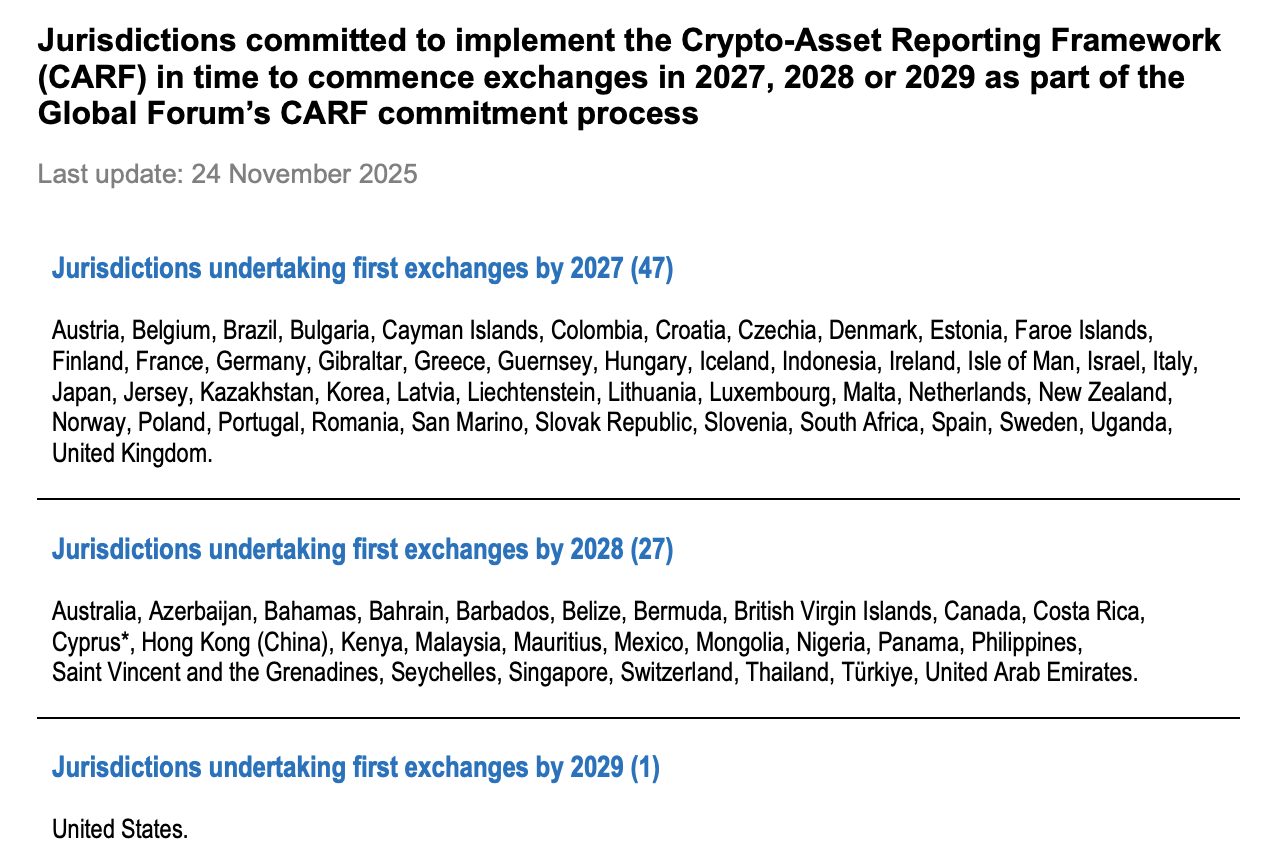Switzerland Delays Crypto Tax Info Sharing Until 2027, Affecting Global Compliance Timeline
Quick Breakdown:
- The Swiss Federal Council officially approved the implementation of the OECD’s Crypto-Asset Reporting Framework (CARF).
- The new rules will require crypto service providers to begin collecting user data in 2026.
- The international exchange of tax information with 74 partner nations is scheduled to start in 2027, fulfilling the country’s commitment to global tax transparency.
Switzerland’s government has adopted a critical piece of international tax regulation for digital assets , signalling the end of the cryptocurrency market’s “Wild West” era in the neutral nation. The Swiss Federal Council approved significant updates to the country’s Automatic Exchange of Information (AEOI) Ordinance, including the introduction of the new Crypto-Asset Reporting Framework (CARF) developed by the Organisation for Economic Co-operation and Development (OECD).
Although the CARF’s legal framework is set to take effect in Switzerland on January 1, 2026, the automatic exchange of data with foreign tax authorities won’t begin until 2027. In practice, this means crypto service providers will need to register and carry out due diligence checks starting in 2026, but the information they collect during that first year won’t be shared until the following year.
The reporting framework aims to close tax loopholes
The move is part of a broader global effort to improve tax transparency and curb cross-border tax evasion involving digital assets. The aim is to close gaps in the current system and make sure crypto-assets are treated on par with traditional financial instruments.
Under the new rules, Reporting Crypto-Asset Service Providers (RCASPs), including exchanges, brokers, and certain wallet providers, will need to collect standard KYC information from their customers. They’ll also be required to submit annual reports to the Swiss Federal Tax Administration (FTA) detailing activity such as crypto-to-crypto trades, crypto-to- fiat transactions, and transfers.
The Swiss Parliament recently approved expanding the AEOI framework to include crypto-assets. Once fully rolled out, the exchange network will cover 74 partner jurisdictions, including all EU member states and most G20 nations. Some major economies, such as the United States, China, and Saudi Arabia, are not included for now because they haven’t fully adopted the OECD standard. The U.S., however, is expected to introduce its own version in 2027.
 Source
:
OECD
Source
:
OECD
Meanwhile, Switzerland-based FUTURE Holdings AG, focusing on institutional Bitcoin treasury and infrastructure, secured CHF 28 million in a major funding round led by Fulgur Ventures, Nakamoto, and TOBAM. This investment will expand its platform, aiming to establish Switzerland as Europe’s top hub for institutional Bitcoin finance by bridging Bitcoin with legacy finance for corporate and financial clients under stable regulation. The substantial rise highlights accelerating institutional adoption.
Take control of your crypto portfolio with MARKETS PRO, DeFi Planet’s suite of analytics tools.”
Disclaimer: The content of this article solely reflects the author's opinion and does not represent the platform in any capacity. This article is not intended to serve as a reference for making investment decisions.
You may also like
Bitcoin Updates: Bitcoin Faces 23.6 Fib Level—Could Past Trends Spark an Altcoin Recovery?
- Bitcoin dominance fell to 59% at the 23.6 Fibonacci level, signaling potential altcoin rotation amid ETF outflows and price declines. - Corporate Bitcoin accumulation grows, with Hyperscale Data holding $70.5M in Bitcoin (77% of market cap) and Bitfarms holding $156M in Bitcoin. - Analysts highlight macroeconomic pressures and regulatory uncertainty as constraints on altcoin growth despite technical indicators suggesting capital rotation. - Market focus remains on Bitcoin stabilization above $80,000 and

Interoperability Fuels DeFi’s Evolution as Hemi and LI.Fi Connect Blockchains
- Hemi and LI.Fi expanded crosschain interoperability by integrating LI.Fi's bridge and swap API, enabling seamless token transfers across EVM and non-EVM networks like Solana . - Users can now transfer assets like USDC between chains in single transactions using routing tools, reducing friction for DeFi participants and developers. - The partnership standardizes crosschain workflows, eliminating fragmented bridge solutions while supporting liquidity aggregation across EVM, Solana, and alt-VMs. - By stream

Vitalik Buterin's Latest Support for ZK Technology and What It Means for the Cryptocurrency Industry
- Vitalik Buterin is driving a blockchain shift via ZK tech, enhancing Ethereum's scalability and privacy. - ZK infrastructure's $28B TVL surge highlights projects like zkSync Era and StarkNet boosting DeFi and gaming. - Investors target EVM-compatible ZK rollups and privacy toolkits, aligning with Ethereum's ZK roadmap.

XRP News Today: IMF Cautions That Tokenized Markets Could Face Collapse Without International Cooperation
- IMF warns tokenized markets risk destabilizing flash crashes due to rapid growth and interconnected smart contracts. - XRP highlighted as potential cross-border payment solution but not endorsed, alongside Stellar and Bitcoin-Lightning hybrid models. - Global regulators intensify oversight of tokenized assets, with ESMA, SEC, and central banks addressing governance and liquidity risks. - IMF stresses urgent need for coordinated policy frameworks to prevent fragmentation and systemic vulnerabilities in ev

